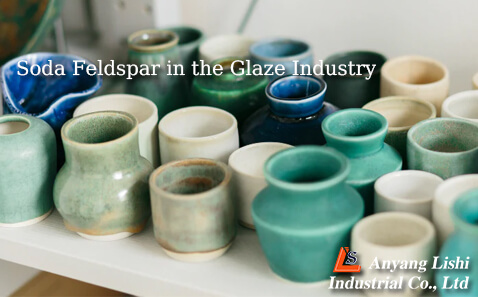
Soda feldspar, a type of feldspar mineral, plays a pivotal role in the glaze industry. Its unique properties and composition make it a fundamental component in the production of glazes used for ceramics and pottery. In this article, we will explore the significance of soda feldspar in the glaze industry and how it contributes to creating beautiful and durable ceramic finishes.
Soda feldspar, also known as sodium feldspar, is a type of feldspar mineral that contains a significant amount of sodium and aluminum, along with silica. Its chemical composition, primarily Na2O-Al2O3-6SiO2, sets it apart from other feldspar varieties. This unique composition gives soda feldspar distinct properties that are highly valuable in the glaze industry.
Soda feldspar is primarily used in glaze production to:
Control Thermal Expansion: Soda feldspar’s low coefficient of thermal expansion is crucial in preventing cracks and defects in the glaze during cooling and temperature changes. It contributes to the durability of the finished ceramic product.

In the glaze industry, the quality of soda feldspar is of utmost importance. High-quality soda feldspar ensures consistency in glaze composition, resulting in reliable and reproducible glaze properties. It also minimizes defects and variations in the finished ceramic products, which is critical for meeting industry standards and customer expectations.
Soda feldspar’s unique properties and composition make it a cornerstone in the glaze industry. Its ability to lower melting temperatures, enhance gloss, and control thermal expansion contributes to the production of stunning and durable ceramic finishes. As the glazing industry continues to evolve, it is crucial to balance the demand for soda feldspar with responsible environmental practices, ensuring a sustainable future for this essential material.
Are you interested in learning more about soda feldspar or have questions about its applications in the glaze industry? Check out our frequently asked questions below for further insights.
Frequently Asked Questions
Soda feldspar is used in glaze production to lower the melting temperature, increase viscosity, enhance gloss, and control the thermal expansion of the glaze.
High-quality soda feldspar ensures consistency in glaze composition, resulting in reliable and reproducible glaze properties, and minimizing defects in finished ceramic products.
To address environmental concerns, responsible and sustainable mining practices are encouraged to minimize the ecological impact of soda feldspar extraction.
Anyang Lishi Industrial focuses on High-quality soda feldspar powder, We provide 100 &200 Mesh feldspar powder specialized in the glaze.
Yes, soda feldspar has various industrial applications, including its use in ceramics, glass manufacturing, and paints and coatings.

Whether you have questions or you would just like to say hello,Contact us!
Call Anytime:
+86 15837207537Send E-mail:
info@lsakminerals.comAddress:
Anyang City , Henan Province, China.